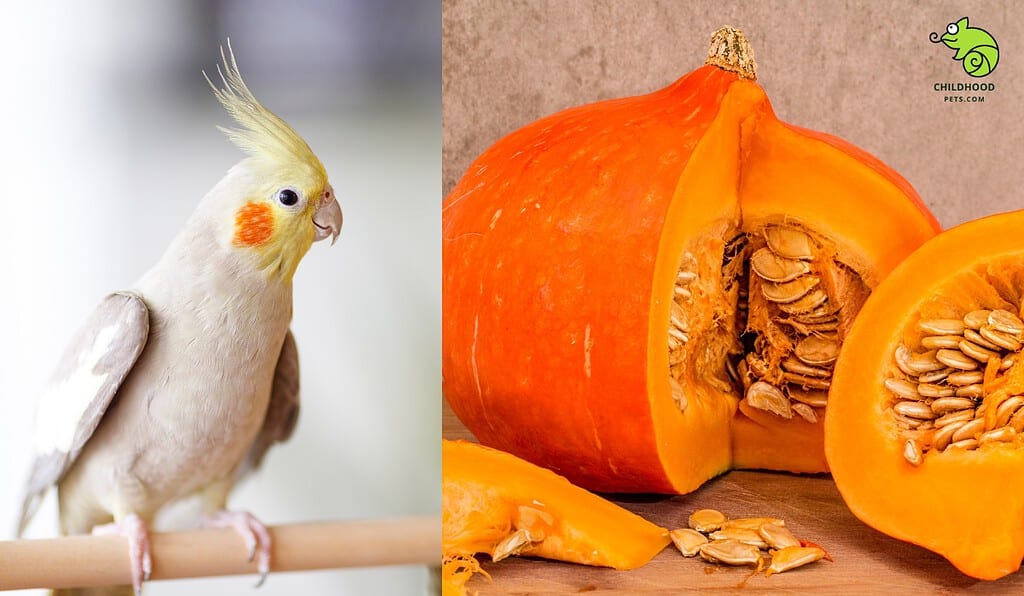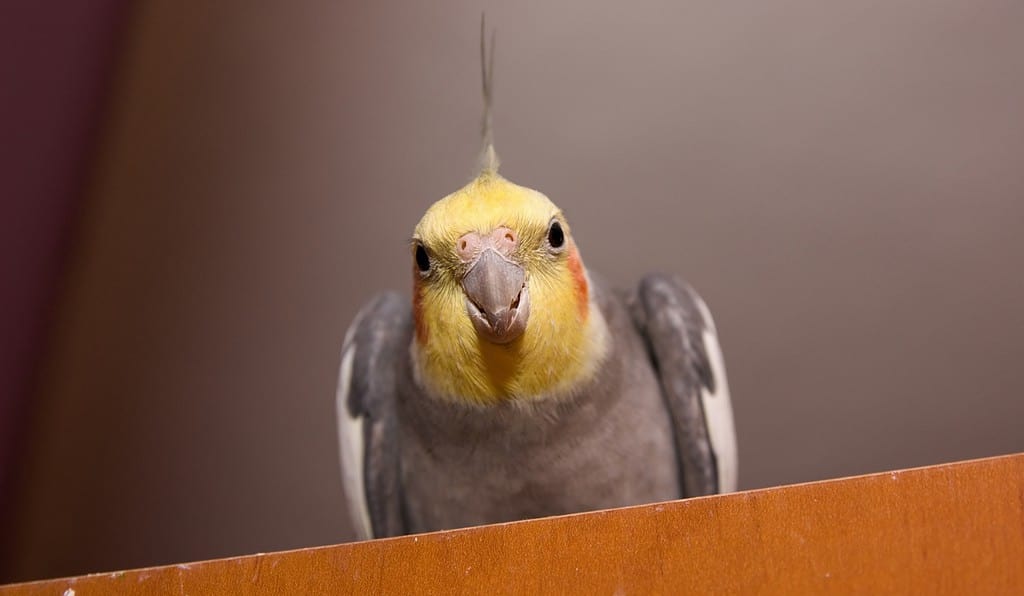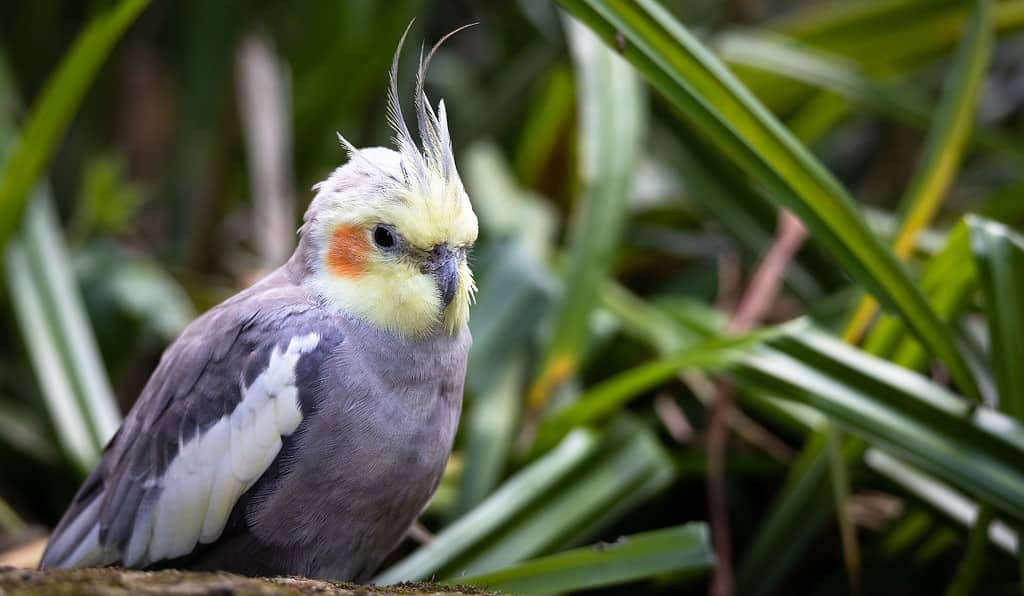
Pumpkin seeds, often hailed as a superfood for humans, are packed with nutrients and have been a staple in diets across cultures for centuries. Their crunchy texture and nutty flavor make them a favorite snack for many. But what about our feathered friends? Specifically, can cockatiels partake in the pumpkin seed craze?
As a general rule, cockatiels can eat pumpkin seeds. These seeds are nutritionally rich, offering protein, essential minerals, and beneficial fatty acids. However, moderation is key, and they should be given as a treat rather than a primary food source.
Curious about the specifics? Want to know how pumpkin seeds fit into a cockatiel’s diet and how to serve them? Dive in as we explore the benefits, potential concerns, and best practices for feeding pumpkin seeds to your beloved cockatiel. Let’s embark on this feathery journey together!
Understanding Cockatiels’ Natural Diet
To truly grasp the role of pumpkin seeds in a cockatiel’s diet, it’s essential to understand their natural eating habits. In the wild, cockatiels primarily feed on various seeds, fruits, and greens. Their diet is diverse, ensuring they receive a range of nutrients. Introducing pumpkin seeds is a nod to their natural inclination towards seed consumption.
The Origins of Pumpkin Seeds in Bird Diets
Historically, indigenous communities have observed wild birds, especially those in the parrot family, feasting on pumpkin seeds. These observations led to the inclusion of these seeds in the diets of domesticated birds. Understanding this history gives us insight into the natural affinity birds have for these seeds.
Pumpkin Seeds vs. Other Seeds
While we’ve touched upon the nutritional comparison of pumpkin seeds with other seeds, it’s crucial to understand why pumpkin seeds stand out:
- Digestibility: Pumpkin seeds are relatively easy for cockatiels to digest, making them a suitable treat.
- Taste: Many cockatiel owners report that their pets seem to prefer the taste of pumpkin seeds over some other seeds.
- Versatility: Pumpkin seeds can be mixed with other seeds or served alone, giving owners flexibility in feeding.
The Science Behind Pumpkin Seeds
Recent studies have shown that pumpkin seeds contain a compound called cucurbitacin. This compound has anti-parasitic properties, which can be beneficial for birds. While it’s not a replacement for vet-prescribed treatments, it’s an added advantage of including pumpkin seeds in their diet.
Nutritional Value of Pumpkin Seeds for Cockatiels
Before we dive into the nitty-gritty, let’s set the stage by understanding the nutritional punch these seeds pack.
Benefits of Pumpkin Seeds
Pumpkin seeds are like tiny powerhouses of nutrition. Here’s why:
- Protein, Fat, and Fiber Galore: These seeds are a great source of protein, which aids in muscle growth. The fat content, while slightly high, provides much-needed energy. And let’s not forget the fiber, which ensures a healthy digestive system.
- Mineral Magic: Cockatiels can benefit from the iron, phosphorus, magnesium, and manganese found in pumpkin seeds. These minerals play a crucial role in maintaining strong bones and overall health.
- Heart-Healthy Fats: The omega-three and omega-six fatty acids in pumpkin seeds are a boon for heart health.
| Seed Type | Protein | Fat | Fiber | Iron | Magnesium |
| Pumpkin Seeds | High | High | Moderate | High | High |
| Sunflower Seeds | Moderate | High | Low | Moderate | High |
| Millet | Low | Low | High | Low | Moderate |
| Flax Seeds | Moderate | Moderate | High | Low | High |
| Sesame Seeds | High | Moderate | Moderate | High | High |
🚀 Pro Tip: When introducing new seeds to your cockatiel, always start with a small amount to monitor for any adverse reactions.
Potential Concerns
But, like all good things, moderation is key. Here’s why:
- Fat Content: Pumpkin seeds are slightly high in fat, especially when compared to other seeds like sunflower seeds.
- Not a Standalone Meal: While nutritious, pumpkin seeds shouldn’t replace a cockatiel’s main meal. Think of them more as a treat.
- Overfeeding Risks: Too many pumpkin seeds can lead to obesity and other health issues in cockatiels.
Always prioritize a balanced diet for your cockatiel over treats.
Storing and Purchasing Pumpkin Seeds
For the best nutritional value and to ensure safety:
- Storage: Always store pumpkin seeds in a cool, dry place. If you’ve bought them in bulk, consider refrigerating a portion to maintain freshness.
- Purchasing: Opt for organic pumpkin seeds when possible. This ensures that the seeds haven’t been treated with pesticides that could harm your cockatiel.
How to Serve Pumpkin Seeds to Cockatiels

Alright, now that we’ve got the basics down, let’s talk about the best ways to serve these seeds to our feathered pals.
Raw vs. Cooked
When it comes to pumpkin seeds, there’s a bit of a debate:
- Raw Seeds: Serving raw seeds ensures that all the nutrients and enzymes are intact. Plus, the natural texture can be a treat for your bird.
- Commercial Brands: Be wary! Some store-bought seeds might have added salt or preservatives, which aren’t great for cockatiels.
- Cooked Pumpkin: Some argue that cooking the pumpkin can make it easier to digest, but it’s essential to avoid any additives or spices.
🍴 Quick Tip: If opting for store-bought pumpkin seeds, always check the ingredient list for any added salts or preservatives.
Portion Sizes and Frequency
Remember, moderation is the name of the game:
Bird’s Weight: 100-120 grams
Pumpkin Seeds Portion: 30-40 grams/day
Typically, you’d want the seeds to be no more than 10% of your cockatiel’s diet. A few ounces once or twice a week should do the trick.
Back when I had my first cockatiel, Charlie, I remember the excitement in his eyes when I introduced him to pumpkin seeds. It was love at first bite! But, as with all treats, I made sure to keep an eye on the portion sizes.
Every cockatiel has its unique taste preferences. It’s all about finding what they love and ensuring it’s safe for them.
Incorporating Pumpkin Seeds in Homemade Cockatiel Treats
For those who enjoy making homemade treats for their pets, pumpkin seeds can be a fantastic ingredient. Consider creating a seed mix bar with pumpkin seeds, honey, and other bird-safe seeds. Baking them in small bite-sized pieces can provide a fun treat for your cockatiel.
Cockatiel’s Reaction to Pumpkin Seeds
Every cockatiel is unique, and their reactions to new foods can be a delightful experience for owners:
- First-time Introduction: Some cockatiels might be hesitant at first. It’s essential to be patient and allow them to explore this new treat.
- Observing Behavior: Watch for signs of enjoyment, like the cockatiel grinding the seed with its beak or seeking more after the first taste.
Potential Allergies and Sensitivities
Just like humans, birds can sometimes exhibit allergies or sensitivities. While rare, some cockatiels might be allergic to components in pumpkin seeds. Signs to watch out for include:
- Excessive itching or feather plucking
- Respiratory distress or wheezing
- Changes in droppings
If you notice any of these signs after introducing pumpkin seeds, discontinue feeding and consult with a vet.
The Importance of Variety in a Cockatiel’s Diet

Variety is the spice of life, and this holds true for our feathered friends as well. A varied diet ensures that cockatiels receive a broad spectrum of nutrients, which is essential for their overall health and well-being. In the wild, cockatiels have access to a diverse range of foods, from seeds and fruits to insects and greens. By providing a varied diet in captivity, we can mimic their natural eating habits and ensure they get all the essential nutrients.
The Role of Enzymes in Digestion
Enzymes play a crucial role in the digestion process of cockatiels. These biological catalysts help break down food into simpler forms, making it easier for the bird to absorb the nutrients. Different foods contain different enzymes, which is why it’s essential to provide a varied diet. Pumpkin seeds, for instance, contain certain enzymes that can aid in the digestion of fats and proteins.
Hydration and Its Importance
Just like humans, cockatiels need to stay hydrated. Water plays a vital role in various bodily functions, including digestion, temperature regulation, and waste elimination. Always ensure that your cockatiel has access to fresh and clean water. Change the water daily and clean the water dish regularly to prevent bacterial growth. Additionally, foods like fresh fruits can also provide hydration.
The Dangers of Feeding Human Foods
While it might be tempting to share your meal with your feathered friend, not all human foods are safe for cockatiels. Some foods, like chocolate, avocado, and onions, are toxic to birds and can cause severe health issues. Always do your research before introducing a new food to your cockatiel’s diet. If in doubt, consult with a veterinarian.
Molting and Nutritional Needs
Molting is a natural process where birds shed their old feathers and grow new ones. During this period, cockatiels have increased nutritional needs, especially for protein. Foods like pumpkin seeds, which are rich in protein, can be beneficial during the molting period. However, it’s essential to balance it out with other nutrients to ensure the bird’s overall health.
Other Dietary Considerations for Cockatiels
Feeding our feathered friends isn’t just about handing over a treat now and then. It’s about ensuring they get a balanced diet that meets all their nutritional needs. Let’s dive into some other dietary considerations for cockatiels.
Importance of a Balanced Diet
A cockatiel’s diet should be as colorful and varied as their personalities. Here’s a general guideline:
- Commercial Pellets: These should make up about 75%-80% of their diet. They’re specially formulated to ensure your bird gets all the essential nutrients.
- Fresh Vegetables & Fruits: Veggies and fruits should account for 20%-25% of their diet. Think leafy greens, carrots, and bell peppers.
- Seeds: The remaining 10% can be of seeds, including our star of the day, pumpkin seeds.
Seeds, Nuts, and Fruits Suitable for Cockatiels
There’s a smorgasbord of options when it comes to treats for cockatiels:
- Millet: A favorite among many cockatiels, it’s like the popcorn of the bird world.
- Hemp Seeds: These are packed with essential fatty acids.
- Sesame Seeds: A good source of calcium and other minerals.
- Flax Seeds: Great for the omega fatty acids.
- Almonds: In moderation, these nuts are a protein-packed treat.
- Berries: Think blueberries, strawberries, and raspberries. Just ensure they’re fresh and washed.
- Apples: A crunchy treat, but remember to remove the seeds.
- Bananas: These can be a sweet treat, but again, moderation is key.
🍏 Did You Know? Apple seeds contain a small amount of cyanide, which is why it’s essential to remove them before offering apples to your cockatiel.
Frequently Asked Question
Can I feed my cockatiel pumpkin flesh along with the seeds?
Absolutely! Cockatiels can enjoy both pumpkin seeds and the flesh. However, always ensure the pumpkin is fresh and hasn’t been seasoned or treated with any additives or spices. The natural, raw pumpkin can be a nutritious treat for them.
How often should I replace pumpkin seeds in my cockatiel’s cage?
For optimal freshness, it’s recommended to provide your cockatiel with new pumpkin seeds daily. At the end of the day, make sure to clear out any seeds that remain uneaten to maintain cleanliness and prevent any potential mold growth.
My cockatiel doesn’t seem interested in pumpkin seeds. What should I do?
Birds, like humans, have their own unique tastes. If your cockatiel isn’t initially interested in pumpkin seeds, give it some time. You can reintroduce the seeds after a few days or consider mixing them with other seeds that your bird loves. Sometimes, a little variety can pique their interest!
Conclusion
Feeding our cockatiels is more than just a routine; it’s an act of love. Pumpkin seeds, with all their benefits, can be a delightful addition to their diet. But as with everything, moderation is crucial. Always strive for a balanced diet, and don’t hesitate to consult with a vet if you’re unsure. Your feathered friend relies on you for their well-being.
I’d love to hear from you! What are your thoughts on feeding pumpkin seeds to cockatiels? Do you have any personal experiences or tips to share? Drop your insights in the comments below. And if this article resonated with you or enlightened you in any way, please consider sharing it with fellow bird lovers. Together, let’s create a community where our feathered friends thrive! 🦜🎃🌱
